EPC home ratings: 'All of a sudden our kitchen ceiling fell through'
- Published

Despite numerous problems with her home, Jacqueline was recently sent a section 13 notice to increase the rent
Rishi Sunak's scrapping of policies that would have forced landlords to upgrade the energy efficiency of their homes was part of a series of changes to his government's green commitments. But where does it leave those renting some of the least energy efficient homes in England?
When Jacqueline moved into her house, she found mould, rat traps and cardboard covering holes in the ceiling. After much discussion, her landlord agreed to make repairs and fit a new boiler.
Instead, the rent was raised.
Another renter, Liz, battles mould on her walls and possessions. She got a call from her landlord saying he was probably letting the property illegally due to its poor energy efficiency rating.
'I can see my landlord's five-bedroom house'
Liz, whose name has been changed, lives in a bungalow in Leicestershire with an energy performance certificate (EPC) rating of F, despite a law change more than three years ago which made E the minimum.
An EPC shows how energy efficient a building is in relation to the amount of heat and light it uses. It gives a rating from A (the best) to G and all homes that are sold or rented must have one.
In the eight years Liz and her partner have lived there, they have struggled with the growth of potentially dangerous black mould on the walls, which she says is caused by a lack of insulation.
"We moved here in June 2015, and when we went to turn the mattress just after Christmas 2016, it was black underneath," she says.
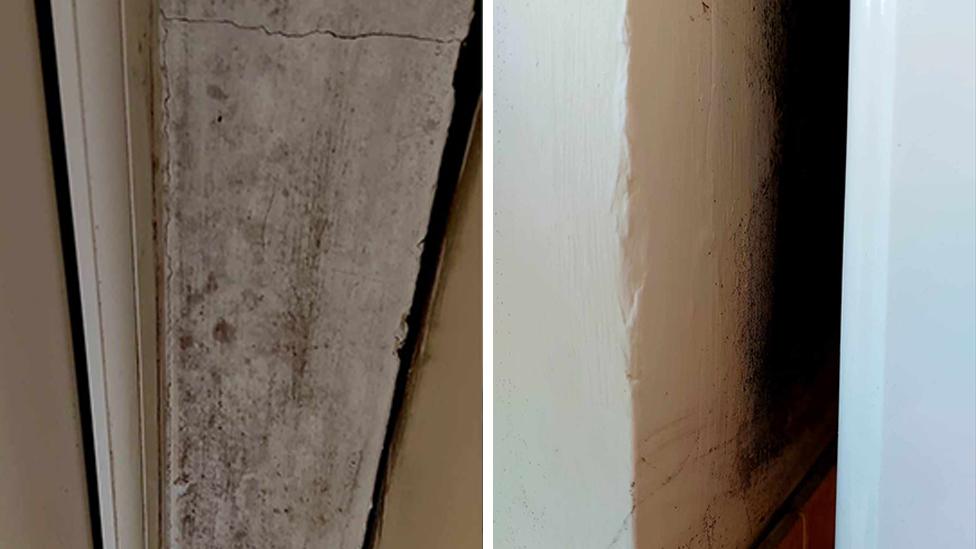
Left: Stains left over after the mould is cleaned away. Right: Black mould trapped behind a wardrobe
They also have mould on the walls and behind fixtures, which they regularly spend time cleaning.
"To be honest, that's depressing in itself, like every once in a while you're having to go, 'I've got to wipe the walls down again'," she says.
By contrast, Liz says she can see her landlord's "big five-bedroom detached house" from her window.
A few weeks ago, she says, her landlord called to tell her "he might be renting the property illegally due to the EPC rating". He then arranged for a new assessment to be done, which again came back with an F rating, but this time with an even lower score.
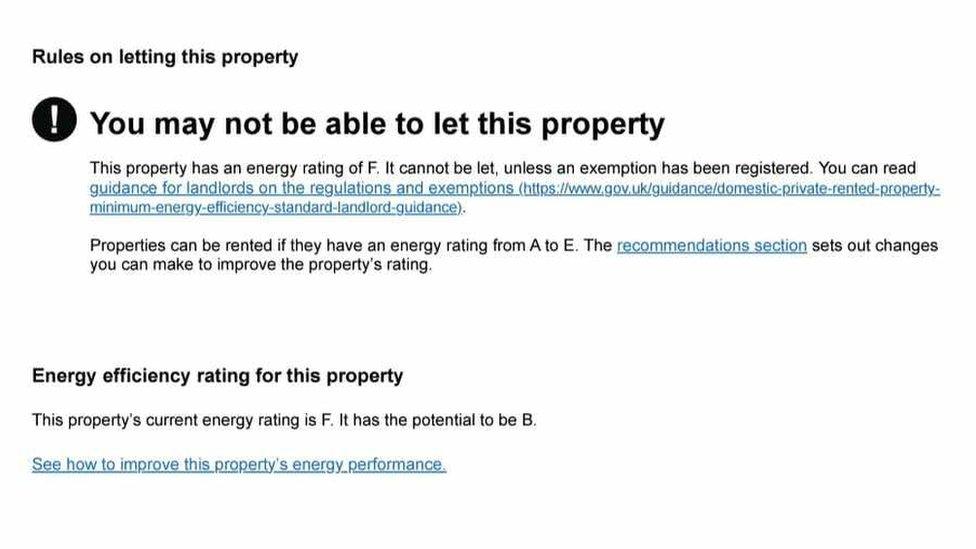
Liz's latest energy performance certificate warned that the property may not be fit to let
Rishi Sunak recently set out changes to the government's green commitments, from delaying a ban on the sale of new petrol and diesel cars, to scrapping proposals for car-pooling.
Among these, the prime minister pledged to scrap policies that would force landlords to upgrade energy efficiency in their homes, after pressure from landlords about the costs.
From 2025, new tenancies were only going to be possible on properties with an EPC of C or higher, and from 2028 this was going to apply to existing tenancies too. Both of these policies were scrapped.
This would have forced the landlords of almost 2.4 million properties in England rated D and below to upgrade their homes, according to data, external from the Department for Levelling Up, Housing & Communities.
Since April 2020, landlords have been unable to continue letting properties rated lower than E without an exemption, which must be registered on the Private Rented Sector Exemptions Register.
When we searched that using Liz's postcode, it showed no registered exemptions.
'I was promised repairs, instead my rent went up'

Jacqueline says it's "disgusting" that Rishi Sunak has abandoned the energy efficiency reforms
In 2021, Jacqueline Long and her family started renting a house in south-east England, which had an EPC rating of E.
They didn't realise until after they moved in that there were holes around the house "big enough for cats" to get through.
As well as letting heat out, to their horror the family realised that these holes had let in rodents, and caused leaks and structural problems.
"One day we were sitting at the kitchen table... the ceiling plaster fell through," she said.
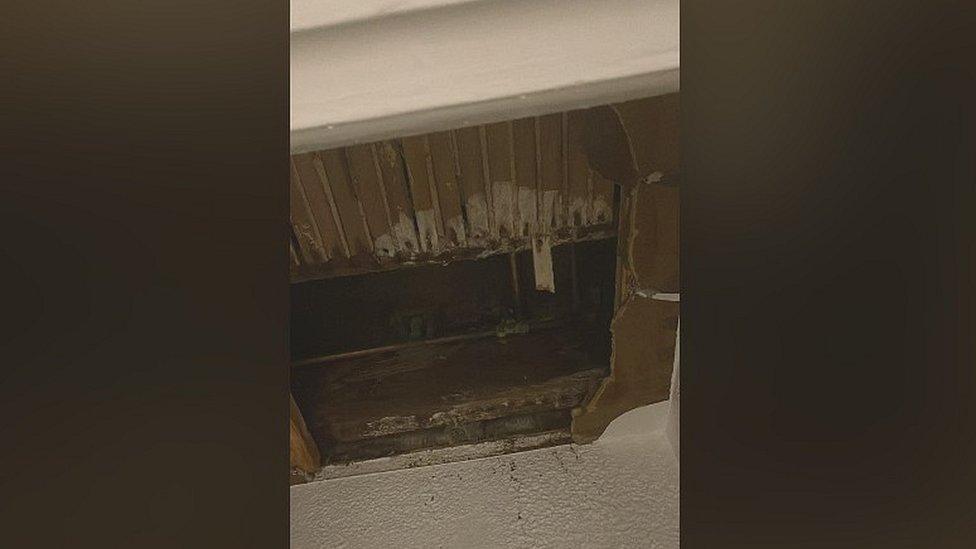
Jacqueline says the house's issues have taken a toll on her mental health
The holes have now been filled in, but Jacqueline says her home is still cold and mouldy, and that the heating needs to be on "all the time" in winter. Last year her energy bills reached £300 a month.
In March of last year, her landlord asked to be given some time to arrange for a new boiler to be installed but she still "hasn't done it", she says.
Despite the issues, she says her agency recently sent a section 13 notice to increase the rent from £1,300 to £1,450.
"It's the fact that she's [the landlord] allowing her property to go into mould and disrepair, but has the nerve to actually charge us that much," Jacqueline says.
"I'm suffering mental health [issues] because of all of this, I've been put on antidepressant tablets. I'm worried about if the landlord's just gonna serve us notice at any month."
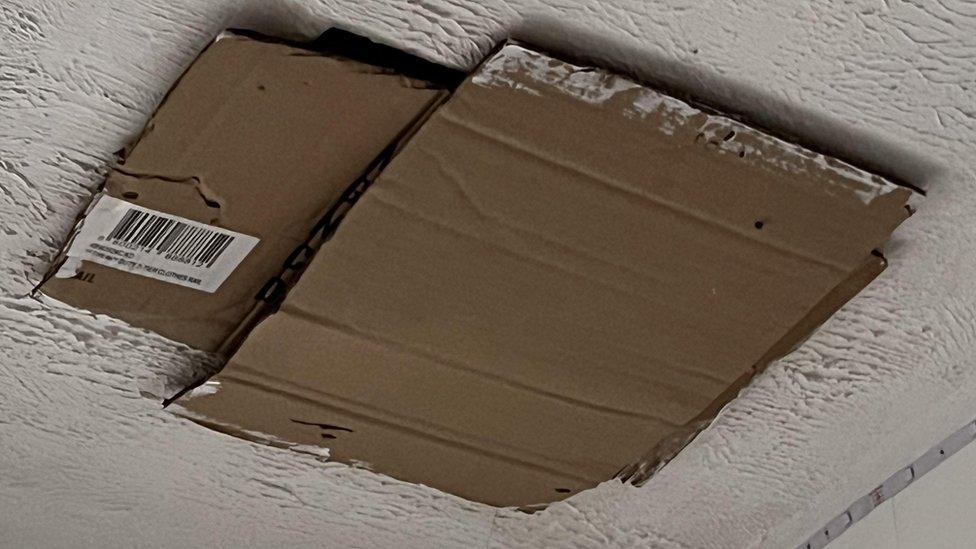
On moving into her home, Jacqueline discovered a hole in the ceiling covered up with cardboard
It's "disgusting" that Rishi Sunak who's "rolling in money" has scrapped the reforms, she adds, as she points to reports that his local electricity network was upgraded to power his home's heated swimming pool.
"If his boiler breaks down. He can just go and get a new one... But for us we're left with estate agents and landlords who don't want to actually repair their houses."
'No way I can do more'
Landlord Nic Overd lets a house in Yeovil, Somerset, and is "thankful that the government has U-turned".
Originally rated a C, she says her property had more double-glazed windows and doors installed but it was downgraded to a D at the next assessment.
"There's no way I can do any more to an end-terraced Victorian house," she says.
If the government had pushed forward with plans to make C the minimum, she says, her tenants "would become homeless" because she would have been forced to sell the house.
"They are happy in the house, their children are growing up in a safe place. I don't charge market value for rent, I'm happy to help ensure they can live."
- Published20 September 2023
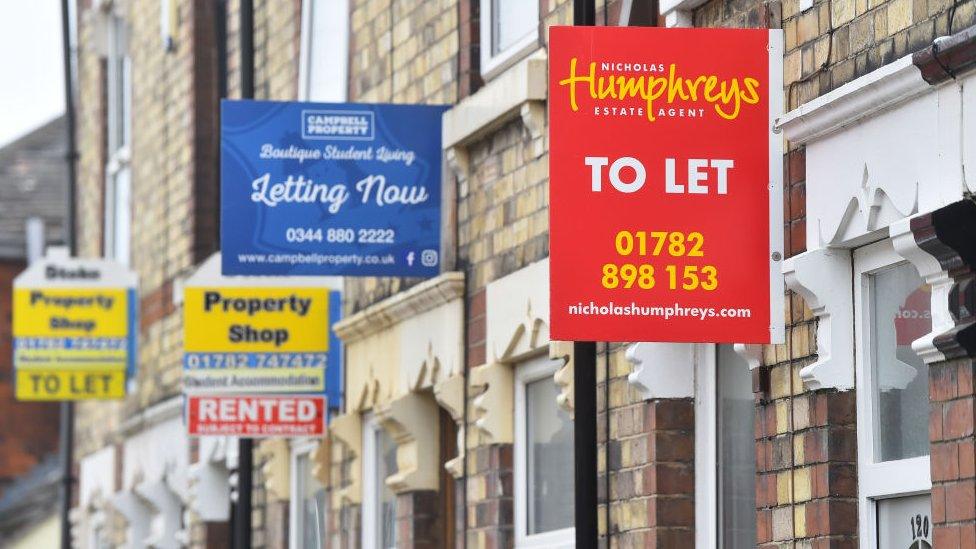
- Published15 August 2023
